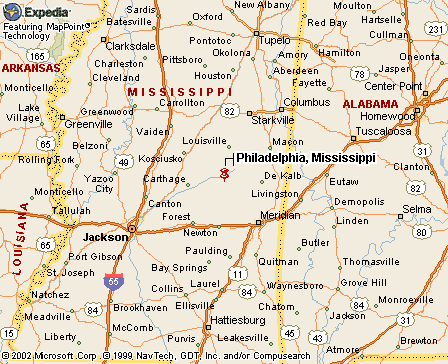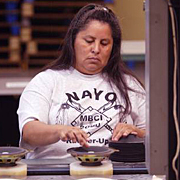|
|
Canku Ota |
|
|
(Many Paths) |
||
|
An Online Newsletter Celebrating Native America |
||
|
May 4 , 2002 - Issue 60 |
||
|
|
||
|
Mississippi Choctaws Find Opportunity |
||
|
by Barbara Hagenbaugh
|
||
|
|
|
Driven by desperation and aided by some politicking and a lot of perseverance, the Mississippi Choctaws have built themselves up from a tribe with rampant poverty to one with a diverse economy and an outpouring of jobs. Now, Choctaws work in factories, hotels, golf courses and high-tech businesses sprinkled throughout the 30,000-acre reservation that is spread across 10 counties in east-central Mississippi in non-contiguous communities. "Most anybody that wants a job can get a job," says Rayburn Waddell, mayor of Philadelphia, Miss., the town closest to the tribe's hub. And more jobs are on the way. The reservation is a bustling construction site as the tribe works to become a resort destination and a player in the high-tech world. The latest addition is a geo-imaging firm, which uses satellite technology to map an area's features such as houses, oil wells and topography down to every minute detail. "We're shifting gears from low to high," says Phillip Martin, 76, who has been chief of the tribe since 1959 and receives much of the credit for the tribe's economic success. Underscoring Martin's success, a couple years ago the tribe moved some of its low-pay, repetitive manufacturing work to Mexico to clear the way for high-tech and higher-paying jobs. Building an economy "It's one of the great success stories in Indian country," says Andrew Lee, executive director of the Harvard Project on American Indian Economic Development. Lee notes that in terms of economic development, the Mississippi Choctaws are ahead of most U.S. tribes. The National Congress of American Indians estimates that nearly half of American Indians are unemployed and one-third live in poverty. Current-day Mississippi Choctaws are ancestors of Choctaws who refused to go on the Trail of Tears in the 1800s, when the U.S. government coerced Indians to move west and many died of malnutrition and exhaustion. The Mississippi Choctaws hid in the swamplands and later became sharecroppers on local farms. Well into the 1900s, the Choctaws were heavily impoverished. In 1962, 86% of Choctaw families earned less than $2,000 a year and only 7% of the tribe, which at that time had about 3,000 members, finished high school. Almost 90% did not have plumbing and the tribe's infant mortality rate was one of the highest in the USA. Because of a lack of education and discrimination, it was tough for Choctaws to land any of the few low-paying jobs available near the reservation. Martin says he couldn't find a job in the mid-1950s even though he had served in the Air Force for 10 years. He also was told he couldn't attend the local junior college because of the color of his skin. "We had to build an economy," says Martin, an understated man with a sly grin and quick laugh. Seeing a trend in manufacturers moving production to the South to avoid working in heavily unionized Northern states, the tribe decided to seek out manufacturers to come to work on the reservation. But finding firms willing to come on board wasn't easy. "We didn't have much to sell except a lot of labor and natural resources," Martin says. The tribe sent thousands of letters to manufacturers without any bites. Finally, in 1979, Packard Electric, a division of General Motors, opened a plant on the reservation to make wiring harnesses for cars. Tax incentives, including no property taxes and employee tax credits, helped entice more businesses to the reservation. American Greetings opened a greeting card plant. The tribe then built an automotive speaker plant, a direct-mail operation and a plastic-molding firm. Today, customers of the reservation's businesses are a Who's Who of Corporate America — ExxonMobil, Caterpillar, Ford Motor, McDonald's and Pepsi, just to name a few. In addition to seeking ties with industry, Martin also made political connections. Since taking over as chief, he has made regular trips to Washington to seek funding and support for legislative measures. The tribe has a paid lobbyist in the nation's capital. And since 1999, the Mississippi Choctaws have given $155,000 to national political parties, with the bulk of the money going to Republicans. Diversified business mix But the biggest phase of the tribe's development came in 1994, when it opened the Silver Star Resort & Casino, which brings in about 3.5 million visitors a year. The Silver Star alone employs 2,300 people and brought in nearly $238 million in revenue for the tribe last fiscal year. Under a law passed by Congress in 1988, tribes are allowed to operate casinos on reservations after negotiating a pact with the state. Revenue is not subject to state taxes and is to be used to boost tribal welfare. The tribe also runs two award-winning golf courses created by golf course designer Tom Fazio and PGA veteran Jerry Pate. About 45,000 people play on the courses each year. Now, the Choctaws are trying to bring in even more tourists. The tribe is building a second hotel-casino, the Golden Moon, a flashy, $290 million building that stands in stark contrast to the surrounding red-clay landscape. It will employ an additional 2,000 people. And to further draw tourists, the tribe is building a $20 million water park that is being designed by a team of people who used to work for Star Wars director George Lucas and Disney. The tribe also is filling in a 280-acre lake for boating and fishing, lining the lake's shores with sand for sunbathing. Facing controversy After that event, the tribe hired a former FBI official to beef up security. He is now Martin's personal security officer and drives the chief's Lincoln Navigator and travels with his boss out of state on the tribe's private plane, bought last year for $4.6 million. Currently, a lawsuit against the tribe argues the Choctaws should pay state taxes, something they dispute because they don't use state services and even run their own fire and police departments. Under U.S. rules, the tribe pays federal but not state taxes. And a group of auto dealers in the state is trying to block the tribe's attempts to enter the car sales business. They argue that because the tribe would be operating on sovereign lands, it would not be subject to the same strict regulations the dealers must follow, creating an uneven playing field. "It gives a huge competitive advantage to them over every other dealer," says Bill Lehman, head of the Mississippi Automobile Dealers Association. "It almost amounts to ... reverse discrimination." And some also are a bit worried that the tribe's success will put them out of business. "It frightens people. It frightens me sometimes," says Steve Wilkerson, owner of Steve's on the Square, a nearby clothing shop. Wilkerson — who stresses that so far the tribe's success has been to his benefit — says he's worried the tribe will follow through on plans to build an outlet mall. Martin shrugs off the opposition. "It's part of doing business," he says. Tribe's success Every year, each of the 8,823 registered tribal members, who must be at least one-half Mississippi Choctaw but are not required to live on the reservation, receives up to $1,000 from the proceeds of the tribe's operations. The 2,150 people who work for the tribal government have 401(k) plans that include a dollar-for-dollar match up to 8% of pay, and many say the pay is competitive. The tribe's revenue has also let it build up its social services, including programs to treat substance abuse and mental health problems and to provide financial education. The tribe has built schools and recently opened a top-notch day care center, funded almost entirely from tribal funds. The tribe pays for any member to go to college, no strings attached, even if he or she has never set foot on the reservation. "This is really a social worker's dream in terms of what is available," says Nann Smith, 43, a Mississippi Choctaw who moved back to the reservation six years ago and is the director of family and community services. The Mississippi Choctaws also are supporting the state economy indirectly as the people they employ and the tourists who come to the reservation spend money in the state, leading to new businesses and increased sales, according to a recent Mississippi State University study. That study found $350 million in economic activity and more than 6,000 jobs that were not directly related to the Choctaws were generated in 2000 as a result of the tribe's enterprises. But perhaps the biggest benefit from the tribe's success is it has drawn people back to the reservation and has recreated a tribal community that was nearly extinct. "If we separated, everybody going on their own way, the culture would die," Martin says. "I never thought that I would come back and work here," says Gary Ben, 39, who moved back to the reservation more than 10 years ago. "A lot of us were born here, a lot of us were raised here, and a lot of us are going to die here. I hope to stay here a long time."
|
||||||||||||||||
| Choctaws aren't the only beneficiaries. Of the approximately 7,000 full-time workers on the Choctaws' $124 million payroll, almost two-thirds are non-Indian. | |

|
www.expedia.com |
|
|
||
|
|
||
| Canku Ota is a free Newsletter celebrating Native America, its traditions and accomplishments . We do not provide subscriber or visitor names to anyone. Some articles presented in Canku Ota may contain copyright material. We have received appropriate permissions for republishing any articles. Material appearing here is distributed without profit or monetary gain to those who have expressed an interest. This is in accordance with Title 17 U.S.C. Section 107. | ||
|
Canku Ota is a copyright © 2000, 2001, 2002, 2003 of Vicki Lockard and Paul Barry. |
||
 |
 |
|
|
The "Canku Ota - A Newsletter Celebrating Native America" web site and its design is the |
||
|
Copyright © 1999, 2000, 2001, 2002, 2003 of Paul C. Barry. |
||
|
All Rights Reserved. |
||
 PHILADELPHIA,
MS - Like many American Indians his age, 28-year-old Tonka Wallace
didn't grow up on a reservation. He doesn't speak the language of
the Mississippi Choctaws, his mother's tribe. And he never once
thought he'd work for the tribe that, to him, was just a distant
connection. But that changed last month, when Wallace moved from
Jackson, Miss., to market the tribe's soon-to-be-opened water park.
He's buying a house for his family of four on the reservation, which
has a population of 8,185. He's also planning to take language classes.
"This place is growing by leaps and bounds," says Wallace,
whose first name means "leader" in Oklahoma Choctaw. "People
want to come here and work."
PHILADELPHIA,
MS - Like many American Indians his age, 28-year-old Tonka Wallace
didn't grow up on a reservation. He doesn't speak the language of
the Mississippi Choctaws, his mother's tribe. And he never once
thought he'd work for the tribe that, to him, was just a distant
connection. But that changed last month, when Wallace moved from
Jackson, Miss., to market the tribe's soon-to-be-opened water park.
He's buying a house for his family of four on the reservation, which
has a population of 8,185. He's also planning to take language classes.
"This place is growing by leaps and bounds," says Wallace,
whose first name means "leader" in Oklahoma Choctaw. "People
want to come here and work."